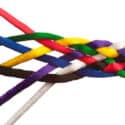Parashat Eikev: Are You a Good Person?

Shabbat Shalom. I’ve got a question for you all to ponder tonight. Perhaps one of the most simple, yet most profound a rabbi can ask her congregation.
Are you a good person?
We are in the second half of the Hebrew month of Av, meaning that the month of Elul is next. Elul is the month in which we prepare ourselves mentally and emotionally for the High Holy Days. A time when we reflect on this simple question: Am I a good person?
What does that even mean? How do we even begin to figure it out? What is “good” and what is not? Who is measuring and who is judging?
This week’s parasha, Eikev, offers several suggestions as to what might define a good person. Deuteronomy 16:16 instructs us: “Cut away, therefore, the thickening about your hearts and stiffen your necks no more.” Cut away the thickening about your hearts is more interpretive of a translation. The Hebrew, u’maltem et orlat l’vavchem, literally means, “Circumcise the foreskin of your heart.”
While shocking at first, this is actually a beautiful metaphor for both men and women. Let’s think: what does a Bris represent? The circumcision allows a man to follow an important mitzvah, and thus become a partner with God, a part of the covenant between God and the Jewish people. The foreskin is thus something that initially marks a separation between man and God, and, once removed, each man is closer to God.
This text teaches us that our hearts can also be separated from God. Each one of us experiences our own barriers between ourselves and the divine. It might be fear, intimidation, pain, hurt, a sense of betrayal, or anger. This text is encouraging us to consider the barriers around our hearts, the “build-up” that prevents us from reaching out, from conversing, from connecting. The next verse of the Torah offers, I believe, some starting points that allow us to cut some of the thickening away, and these actions involve seeing those in need around us.
“For your God Adonai is God Supreme and Eternal Supreme, the great, the mighty, and the awesome God, who shows no favor and takes no bribe, but upholds the cause of the orphan and the widow, and befriends the stranger, providing food and clothing.You too must befriend the stranger, for you were strangers in the land of Egypt.” (Deut. 16:17-19)
So, it seems pretty straight-forward, these holy acts of social justice: Show no favor, take no bribe. Uphold the cause of the widow and the orphan. Befriend the stranger. Provide food and clothing to those in need.
Presumably, these acts would seem to require a removal of the barrier between ourselves and other human beings. They are only possible when we open our eyes to the suffering, the lonely, the hurt, and the frightened people in our midst. Perhaps the text is telling us that one way to cut away the thickening our hearts, to remove the barrier between ourselves and God, is to strive to remove the barrier between ourselves and our fellow human beings.
We know, as a people, what it felt like to be the stranger, and it is our duty to ensure that others do not feel that way. This would certainly seem to be a meaningful way to become a good person, to come a bit closer to being a mensch.
God, may we all find a way to come one step nearer to you this week. May we discover a new mitzvah, a new prayer, a new song, a new sense of gratitude, or a new hope, each with the potential to bring us closer to You. We know that you will meet us halfway, O God, yet we want to do our share of the journey as well. May we approach the New Year of 5777 with a fresh desire to seek You out, within ourselves, in relationship with our friends, and in connection with the world around us.
Ken Y’hi Ratzon,
May this be God’s will.
Amen.





